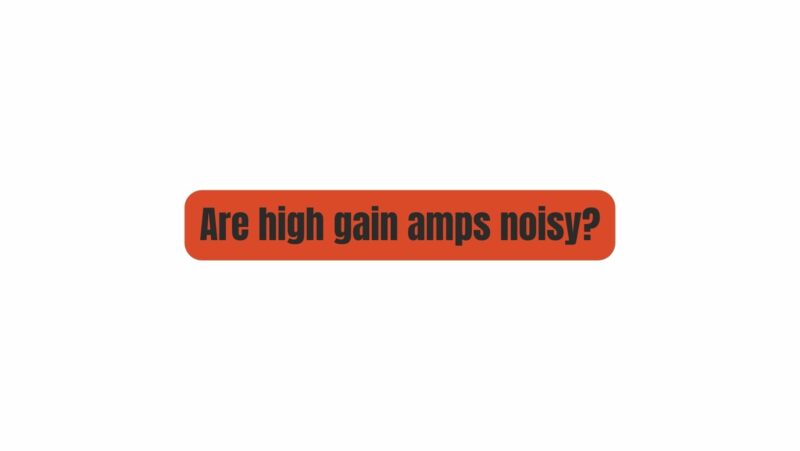High gain guitar amplifiers have long been associated with the world of rock and heavy metal music. These amplifiers are favored for their ability to produce thick, saturated tones and intense distortion that can make a guitar scream with power. However, along with their sonic prowess comes a reputation for being noisy. In this article, we will explore the relationship between high gain amplifiers and noise, dissecting the factors that contribute to this perceived noise, and providing insights into how to manage and minimize it. Whether you’re a seasoned guitarist or just starting your journey, understanding the intricacies of high gain amplifier noise can greatly enhance your playing experience.
Understanding High Gain Amplifiers
Before delving into the topic of noise, it’s essential to understand what high gain amplifiers are and why they are popular among guitarists. High gain amplifiers are designed to amplify the guitar signal to the point of heavy saturation and distortion. This amplification results in a raw and aggressive sound that is characteristic of many rock and metal genres.
High gain amplifiers achieve their distinctive sound through a combination of factors:
- Preamp Gain: The preamp section of an amplifier is responsible for boosting the incoming guitar signal. High gain amplifiers have preamps with a significant amount of gain, allowing them to push the signal into overdrive and produce distortion.
- Distortion Circuitry: These amplifiers often include specialized distortion circuitry, such as gain stages and clipping diodes, to create the characteristic distorted sound.
- High Output Power: High gain amps usually have substantial power output, which contributes to their ability to produce loud, distorted tones suitable for live performances.
- Speaker and Cabinet: The choice of speaker and cabinet also plays a crucial role in shaping the overall tone of a high gain amplifier.
The Perception of Noise
Now, let’s address the perception of noise in high gain amplifiers. Many guitarists believe that high gain amps are inherently noisy, but it’s essential to clarify what is meant by “noise” in this context. In the context of guitar amplifiers, noise can be categorized into two main types:
- Background Hiss: Background hiss is a low-level noise that is often present when the amplifier is turned on, even when no notes are being played. It’s similar to the gentle white noise you might hear from a radio or television when no station is tuned in.
- Signal Interference: Signal interference refers to unwanted noises, such as hum, buzz, or feedback, that occur when the guitar is played through the amplifier. These noises can be particularly distracting and frustrating for guitarists.
Factors Contributing to Noise
Several factors contribute to the perception of noise in high gain amplifiers:
- Electronic Components: The high gain amplification process can amplify not only the desired guitar signal but also any inherent electronic noise within the amplifier itself. Components like tubes or transistors can introduce noise into the signal path.
- Single-Coil vs. Humbucker Pickups: The type of pickups used on the guitar can influence noise levels. Single-coil pickups are more prone to picking up electromagnetic interference, leading to increased noise, whereas humbucker pickups are known for their noise-canceling properties.
- Grounding Issues: Grounding problems in the guitar or amplifier can result in unwanted hum and buzz. Proper grounding is crucial for minimizing noise.
- Power Quality: The quality of the electrical power supply can affect amplifier noise. Poorly regulated power can introduce additional interference into the amplifier’s signal path.
- Cable Quality: The choice of cables used to connect the guitar to the amplifier can impact noise levels. Low-quality or damaged cables may introduce noise.
- Environmental Factors: External factors like fluorescent lighting, Wi-Fi routers, and other electronic devices in the vicinity can introduce interference into the guitar signal.
- Gain Settings: The level of gain dialed in on the amplifier can also influence noise levels. Higher gain settings tend to amplify both the guitar signal and any noise present in the amplifier.
Noise Management and Reduction
While high gain amplifiers can be noisy, there are several strategies and techniques to manage and reduce noise effectively:
- Use Noise Gates: Noise gates are audio devices that automatically mute the signal when it falls below a certain threshold. They can be used to eliminate background hiss and reduce unwanted noise between notes.
- Proper Grounding: Ensure that your amplifier and guitar have proper grounding to minimize ground-related hum and buzz.
- Quality Cables: Invest in high-quality cables to reduce signal degradation and interference.
- Shielding: Consider shielding the electronics cavities of your guitar to reduce interference from external sources.
- Pickup Selection: Choose pickups that suit your playing style and minimize noise. Humbuckers are generally quieter than single-coils.
- Isolate the Amp: Place the amplifier away from sources of interference, such as fluorescent lights or electronic equipment.
- Power Conditioning: Use power conditioners or surge protectors to ensure a clean and stable power supply.
Conclusion
High gain amplifiers are known for their ability to produce powerful and distorted tones, but they can also be associated with noise. Understanding the factors contributing to noise in high gain amplifiers is essential for guitarists looking to optimize their tone and minimize distractions. By addressing issues related to grounding, cable quality, and using noise-reduction tools like noise gates, guitarists can enjoy the benefits of high gain amplifiers without being plagued by excessive noise. Ultimately, the choice of amplifier, guitar, and setup should align with your playing style and preferences, allowing you to achieve the tone you desire while managing any potential noise effectively.


